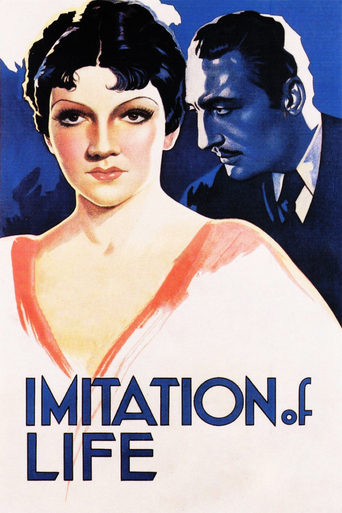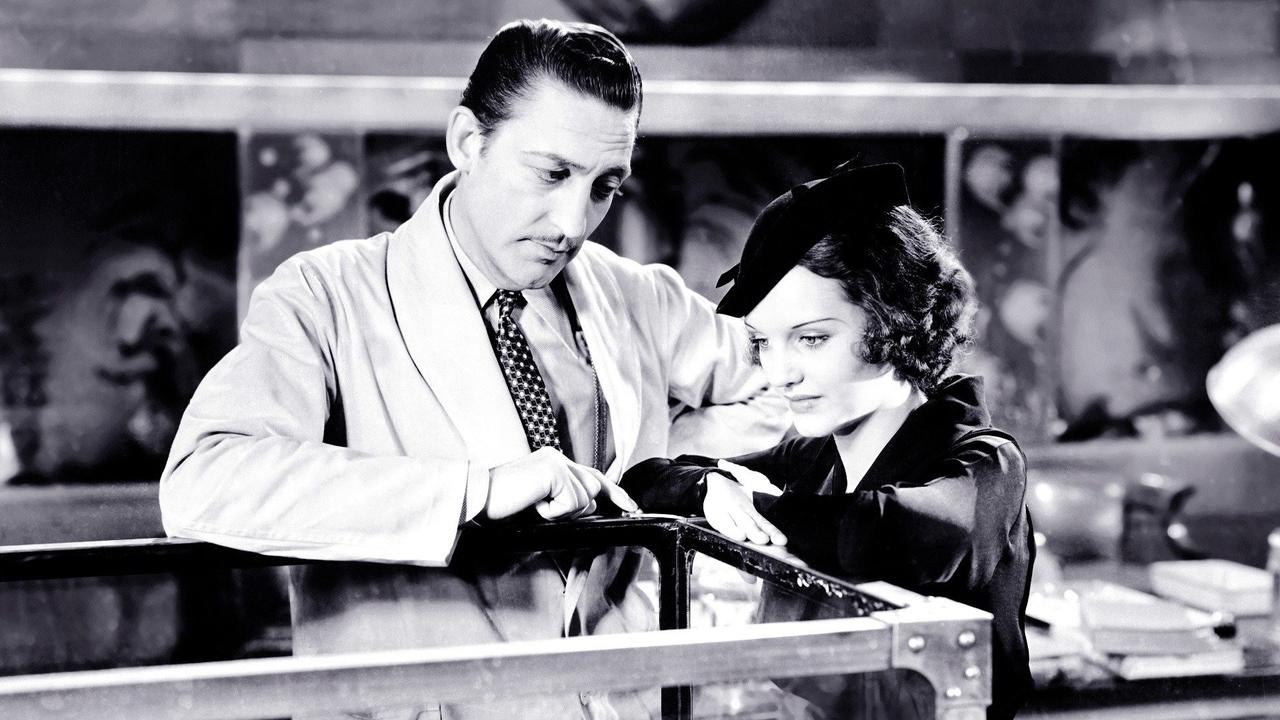zoeyhardy
I saw the remake years ago. I liked it, but not enough to watch it again. I didn't know there was an original, and stumbled upon it by accident. I was so glad I did. I read others reviews about it being racist, but this was in 1934. Obviously, today this movie wouldn't be relevant, but 83 years ago, I think it was realistic for Delilah to want her life to be the same. When she's told she's made enough money to buy her own house, and a car, she tells Bea not to send her away. She explains she's her cook, and wants to stay her cook, (In real life, Louise Beavers hated to cook) and she only wanted money for her funeral. It was very heartwarming, and probably the most touching movie I've seen in years. Even though Louise Beavers was credited 4th, she was the star. She was so kind, selfless, never complained, and always put everyone before herself. The two women, Delilah and Bea, formed a friendship that spanned 15 years. Together, they built a business that became very successful. I was intrigued by Elmer's million dollar idea, with only two words, "Box it." But, the daughters of two women, brought emotional, and heartbreaking issues to the second half of the movie. I felt so bad for Delilah, and then for her daughter who realized too late, how sorry she was for being ashamed of her mother. Movies don't make me cry, but this one had me in tears. Not so much for Bea's issues with her daughter; but, from the heartbroken Delilah, after her daughter told her she leaving. And how she didn't want anyone to know she was her daughter. Nothing could have been more painful than that, and her death was proof that a you can die from that kind of pain. Watch it with the mindset it was written in, as well as the year. It's emotional, but worth watching. It also makes you appreciate the issues people had to deal with then, aren't at all issues of today.
oOoBarracuda
The iconic Claudette Colbert was the shining star in John M. Stahl's 1934 film Imitation of Life, based on a book by Fannie Hurst of the same title. Colbert along with Louise Beavers, Fredi Washington, and Rochelle Hudson join together to expose the hardships of women who must enter the workforce in a time when women were only to maintain households. In addition to the struggle of a family who lost their patriarch, the audience also experiences through the film the multi- faceted race relations that consumed people of color in the 1930's. The two intertwined tales of personal struggle create a window into the world of the 30's social constructs to engage a whole new audience in their complexities.Bea Pullman (Claudette Colbert) becomes a single mother to her daughter Jessie (Rochelle Hudson) after the death of her husband. Struggling to maintain both the household and her husband's business, Bea is blessed with an angel in the form of housekeeper Delilah Johnson. (Louise Beavers) Delilah comes to Bea's door with a proposition to work for the Pullman family for only room and board in exchange. Delilah is not alone, however, she also has a daughter Peola (Fredi Washington). Peola and Jessie are about the same age and Bea doesn't have the money to hire a much-needed housekeeper; the arrangement seems like a fit for all parties involved, so Bea agrees. The two women become fast friends and eventually spring an idea to market Ms. Delilah's pancake recipe. The idea takes off and the duo becomes incredibly wealthy. No matter how much wealth the two accumulate, Delilah requests that she and Peola remain living with Bea and Jessie. The girls grow together, as much as they can, in a world strained by racism. Jessie, being afforded many more opportunities especially in regards to education, flourishes into adulthood and takes off for college. Peola, however, becomes a victim of intolerance and constantly tows the line between her true self, and the self she assumes when she passes as a white woman. Peola becomes estranged from her mother, due to her deep resentment of Delilah's dark skin. Mother-daughter relationships are difficult enough to navigate, Imitation of Life goes to show that this is an age-old difficulty made no easier by also having to deal with death, racial tensions, and heartache along the way.If you're an old film lover like me, this film will you why you are. There is nothing quite like that softly gleaming glow that a great black and white movie puts off. Claudet Colbert is a national treasure, and if you haven't seen her acting, you should--today. The real power behind this film is its distinct story line. Of course, no one denies the existence of the obvious racism that filled the earlier days of this country. This film takes a unique line of that struggle to focus on the problems that light-skinned black people often went through. Peola could pass for white because her father before her was light skinned. In passing as white, Peola also had to disown her mother. There is no greater pain for a single mother than to be abandoned by her daughter. In contrast, Jessie was afforded much more opportunities due to her skin color and was able to maintain a healthy relationship with her mother. This class distinction was beautifully, and painfully, illustrated in the image of Bea ascending up the stairs while Delilah descended down the stairs immediately following their discussion of college plans of their daughters. This scene depicted, in such a stark way, the level of divide between races at the time, which were present regardless of income. Delilah had amassed a fortune with Bea due to her pancake recipe yet was still treated as a second-class citizen with a daughter that resents her. Many films deal with race, but the added struggle of both the women being single mothers creates a film that will not be forgotten in Imitation of Life.
sconn4200
I was amazed to learn that there was another version of "Imitation of Life", quite different from the one done in the 50's. Forever, I claimed the Lana Turner version as one of my favorite movies until I saw the original classic done in1934 with Claudette Colbert, handsome Warren Williams and Louise Beaver playing Delilah Johnson.The dedication and loyalty Ms. Beaver showed for her employer was so genuine and touching but, on the flip side, it also showed how naive she was about securing her own future. I immediately associated this film with the story of Aunt Jemima, since that title is synonymous with the "Mammy prototype" which can be categorized as a black female servant who is extremely protective of her white employer and feels she must take care of her. Miss Colbert, on the other hand, displayed admiral qualities since she insisted that Ms. Beaver profit from her labor.I think minorities would appreciate this version more than the latter because the "lessons learned" would have more significance.Great Storyline
dbdumonteil
...no one can see me cry...(Michael Stipe) Delilah is par excellence the heroine of melodrama;if the sky she looks upon should tumble and fall,she would put her faith in God,and that's exactly what happens. Although her contribution to Bea's phenomenally successful pancakes business is more than useful,all that she wants is a beautiful funeral.Her daughter Peola disowns her ,because she does not want to pass for black.Melodrama has always been somewhat reactionary(and I love melodrama): the 1934 black woman will get pie in the sky,but on the good old Earth,she knows her place:owning a house ,being considered by Bea as an associate eludes her.And however Bea , a liberal woman (wonderfully played by Claudette Colbert ,far superior to Lana Turner in Sirk's remake) really loves Delilah,who is not a servant to her.This black and white version is much closer to Fanny Hurst's novel.The 1959 remake made Bea a star and the biggest mistake was to cast a white actress as Sarah-Jane (Peola).Her mother's name changed too:it became "Annie" .However ,it is hard to tell which version is the best.As I already wrote ,Lana Turner was not an improvement on Claudette Colbert ,and the relationship between the two widows is more touching in the 1934 version.The scene of the pancakes ,although very down-to-earth , wonderfully depicts the rapport they have.And being a business woman ,particularly in the thirties ("They bottled Coca Cola.Do the same for your flour! Box It!),is certainly more challenging for a woman than to be a star.In an interview,Fanny Hurst told that she thought that a woman should occupy the same posts as a man;but she added that it took her twice a man's courage to make half of the way.The main problem in Stahl's versions is the two plots.Male characters are definitely uninteresting and the love affair Jessie /mom's squeeze pales next to Delilah/Peola scenes.Douglas Sirk,in 1959, succeeded in combining the two stories ,although,once more,it's Annie and Sarah Jane the audience remembers.The funeral is more grandiose,more impressive in the color version too.Both versions have their qualities .You should see them one after the other and make up your mind.



 AD
AD



